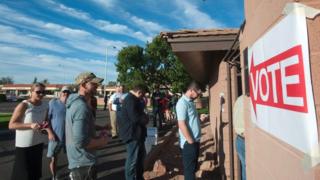U.S. Agencies Get Ready For Election Interference
WASHINGTON (Reuters) – The Super Tuesday primary elections were so far free of any signs of interference, said national security professionals who gathered in Northern Virginia in an unprecedented monitoring effort to counter cyberattacks and foreign disinformation.
A man inserts his voter card into a touchscreen voting machine at a voting center at Oak Park Community Center for the presidential primaries on Super Tuesday in Sacramento, California, U.S., March 3, 2020. REUTERS/Gabriela Bhaskar
“On the specifics of today, we have not seen any acute increase in any misinformation,” said Christopher Krebs, director of the Cybersecurity and Infrastructure Security Agency of the Department of Homeland Security.
Fourteen states are holding presidential nominating elections on Tuesday, with a total of one-third of the delegates for the Democratic nomination at stake.
Since U.S. intelligence agencies concluded that Russia interfered in the 2016 election, the U.S. government has introduced measures to combat hacking and foreign propaganda activities designed to affect the vote.
Moscow has denied the allegations.
(Get all the Super Tuesday action: here)
“I asked the question of what type of activity are we seeing and why aren’t we seeing more, and it’s because of the hardened systems,” said Homeland Security acting Secretary Chad Wolf. “It’s important to pause and take credit for some of the work we’ve done.”
Election security experts say that while the government has made improvements, many vulnerabilities still exist.
Texas’ Secretary of State office said on Tuesday it had received reports of robocalls providing false information to voters. The robocalls told voters in Texas they should cast their ballots on Wednesday, instead of Tuesday, said Stephen Chang, director of communications for the office.
The office identified the phone number responsible for the robocalls and shared information with federal authorities shortly after being notified, said Chang.
Representatives from the Homeland Security Department, FBI, National Security Agency and U.S. Cyber Command were positioned at the Cybersecurity Infrastructure Security Agency (CISA) to respond rapidly to any attacks on Tuesday’s presidential primaries.
State and local election officials spread across the country were also connected to the nerve center in Virginia in case of suspicious cyber incidents.
In a joint statement on Monday, the heads of each participating agency warned of “sharp consequences” for “foreign actors” that attempt to meddle in the 2020 election.
“The level of coordination and communication between the federal government and state, local and private sector partners is stronger than it’s ever been,” the statement read.
Ben Spear, head of the Elections Infrastructure Information Sharing and Analysis Center (EI-ISAC), a contractor for CISA, said that all 50 states had installed monitoring software on their systems since 2016 to detect cyberattacks.
“We’re seeing significant engagement from state and local (officials),” said Spear, noting the differences between the 2020 and 2016 primaries.
Reporting by Christopher Bing; Editing by Peter Cooney and Leslie Adler
READ MORE HERE



